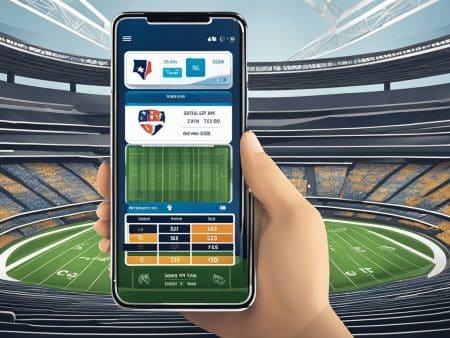New York has established itself as a leader in sports betting tax revenue with its steep 51% tax rate on gross gaming revenue. This rate, tied with New Hampshire and Rhode Island for the highest in the nation, stands in stark contrast to states like Nevada and Iowa, which tax at just 6.75%. Since implementing online sports betting, New York has consistently generated substantial tax income, including $77.4 million in March alone, making it the national leader in tax collection from sports betting.

New York Sports Betting Tax Rates: Impact on Operators and BettorsUnderstanding the Financial Landscape in 2025
The high tax burden has created ripple effects throughout the industry. Operators like DraftKings have responded by implementing surcharges of three to four percent on winning bets’ profits in New York and other high-tax states. This direct pass-through of costs to consumers represents a significant shift in how betting companies are managing their tax obligations.
The substantial difference in tax rates across states has created an uneven playing field for betting operators and varying experiences for bettors. While New York’s approach delivers significant fiscal benefits to the state, it raises questions about the long-term sustainability for operators and the potential impact on betting odds and promotions available to New York residents compared to those in lower-tax jurisdictions.
The Landscape of New York Sports Betting

New York has established itself as a dominant force in the American sports betting market, characterized by high tax rates and substantial revenue generation. The state’s approach has created a competitive environment with limited operators facing high costs while delivering significant tax benefits to state coffers.
Historical Overview and Current Legislation
Sports betting in New York began with a 2013 law allowing in-person betting at commercial casinos. However, the true transformation came in January 2022 when online sports betting launched in the state.
This launch followed the 2019 passage of legislation that created the framework for mobile betting operations. The legislation established a 51% tax rate on gross gaming revenue – the highest in the nation.
Initial licensing included a $200 million collective fee from operators, creating a significant barrier to entry. Despite this high tax rate, New York quickly became the most lucrative sports betting market in America.
The current legislation allows for a sliding tax scale based on the number of operators. If the state expands to 13-14 licensed operators, the tax rate would decrease to 35%, creating potential for market growth.
Key Players in New York’s Sports Betting Market
Despite the challenging tax environment, several major operators have established strong positions in New York. DraftKings and FanDuel lead the market, capturing the largest shares of betting volume and revenue.
Caesars Sportsbook made a significant splash during the initial launch with aggressive promotions, though its market position has stabilized over time. These operators have adapted their strategies to accommodate the high tax rates.
Other licensed operators include BetMGM, PointsBet, and BetRivers, creating a competitive but limited marketplace. The high tax rate has influenced operator behavior, with some offering slightly less favorable odds or reduced promotions compared to lower-tax states.
The limited number of licenses has created a concentrated market where major brands dominate, leaving little room for smaller operators to gain significant market share in New York’s lucrative betting landscape.
Understanding Sports Betting Tax Rates

Tax rates play a crucial role in the sports betting industry, affecting both operators and bettors. New York stands out with one of the highest tax rates in the nation, which shapes the entire ecosystem of sports wagering in the state.
Tax Rate Structure for New York Operators
New York imposes a 51% tax rate on gross gaming revenue from sports betting operations. This means that for every dollar of profit made by sportsbooks, 51 cents goes directly to the state government. This exceptionally high rate was established when online sports betting was legalized in New York.
The tax is calculated based on gross gaming revenue (GGR), which is the total amount wagered minus the payouts to winners. Operators must pay this tax regardless of their other operating expenses like marketing, technology, or staff costs.
Despite this high tax burden, New York has still attracted major sportsbook operators who view the large market size as worth the cost of entry. However, many operators have voiced concerns about long-term profitability under such taxation.
Comparison with Neighboring States
New York’s 51% tax rate stands in stark contrast to its neighbors:
| State | Sports Betting Tax Rate |
|---|---|
| New Jersey | 13.5% (online) |
| Pennsylvania | 36% |
| Connecticut | 13.75% |
New Jersey, with its much lower tax rate, has created a more operator-friendly environment. Many New Yorkers previously crossed state lines to place bets in New Jersey before New York legalized online wagering.
Pennsylvania’s 36% rate, while high compared to most states, is still significantly lower than New York’s. This regional disparity creates competitive challenges for New York operators who must offset higher costs.
The Economics of Tax Rates
The high tax rate in New York generates substantial revenue for the state. In fact, New York leads the nation in tax collection from sports betting, bringing in more than $77.4 million – surpassing Illinois, Pennsylvania, Ohio, North Carolina, and New Jersey combined.
However, this tax structure has economic consequences. Operators often adjust their odds and promotions to compensate for the high tax burden. This can mean less favorable betting lines and fewer bonuses for New York bettors compared to other states.
Some economists argue that extremely high tax rates may eventually limit market growth by reducing operator profitability. This could potentially lead to less competition and fewer choices for consumers.
However, others point to New York’s massive success in generating tax revenue as evidence that the model works for public finances, even if operators face challenges.
Implications for Sportsbooks and Operators

New York’s 51% tax rate on sports betting revenue creates significant business challenges for sportsbook companies. This high rate affects both current operators and those considering entering the market.
Impact on Market Entry and Competitiveness
The steep 51% tax rate in New York creates a high barrier to entry for new sportsbook operators. Companies must carefully evaluate whether they can be profitable under such tax conditions before entering the market.
Existing operators face pressure to maintain their market share while dealing with reduced profit margins. This has forced some companies to scale back their marketing expenses in New York compared to states with lower tax rates.
The limited number of licensed operators in New York also affects market competition. With fewer companies able to profitably operate under the high tax structure, bettors have fewer choices compared to states with more favorable tax policies.
Some legislators have proposed bills to increase the number of sportsbooks and lower the tax rate to create a more competitive environment.
Profitability and Business Strategy
Sportsbooks operating in New York must develop specific business strategies to remain profitable despite the 51% tax burden. Many have reduced promotional offers and bonuses that are common in states with lower tax rates.
Companies are forced to operate with thinner margins, which impacts their overall profitability. Some operators report that while New York generates high betting volume, their actual profits remain limited due to the tax structure.
Operators must balance customer acquisition costs against lifetime value calculations that look very different in New York versus states like Nevada or Iowa with tax rates as low as 6.75%.
This tax pressure has led some sportsbooks to lobby state lawmakers for tax relief, arguing that the current rate is unsustainable for long-term business operations.
Effect on New York Sports Bettors
New York’s high 51% tax rate on sports betting revenue has created a unique environment for bettors in the state. The tax structure influences everything from the odds offered to the promotions available compared to other states with lower tax rates.
Tax Rates and Betting Odds
The steep 51% tax rate in New York often translates to less favorable odds for bettors. Sportsbooks operating in the state typically offer slightly worse payouts compared to states with lower tax rates like New Jersey or Pennsylvania.
For example, a standard -110 line in other states might be offered at -115 or -120 in New York as operators try to maintain profitability. This means New York bettors may need to wager $115 to win $100 on the same bet that would cost only $110 in neighboring states.
Many serious bettors maintain accounts in multiple states to shop for the best lines, often finding better value outside New York. This “odds adjustment” practice helps sportsbooks offset their tax burden but reduces the overall value for New York bettors.
Promotions and Bonuses
New York sports bettors typically receive fewer and less valuable promotions compared to bettors in states with lower tax rates. With the 51% tax rate eating into profits, sportsbooks have significantly scaled back their promotional offerings.
Sign-up bonuses in New York are often smaller than those in neighboring states. While Pennsylvania or New Jersey bettors might receive $1,000 risk-free bets or deposit matches, New York promotions might cap at $200-$500 or offer less favorable terms.
Special promotions like odds boosts, parlay insurance, and loyalty programs are also more limited in New York. Sportsbooks must carefully calculate the return on these investments when more than half of their revenue goes to taxes.
Some operators have even considered reducing their marketing presence in New York altogether, focusing instead on states where customer acquisition costs can be more easily recouped. This creates a less competitive promotional environment for New York bettors compared to other markets.
Revenue and Economic Impact
New York’s 51% tax rate on sports betting has generated substantial funds for the state while creating unique market dynamics. This high rate affects both the financial performance of operators and the state’s ability to fund public programs.
Contributions to State Tax Revenue
New York generated more than $800 million in sports betting tax revenue in 2023 alone. This remarkable figure vastly outpaces other states with lower tax rates, such as South Dakota, which raised less than $100,000 during the same period.
The tax revenue from sports betting in New York goes almost entirely to public education. The state directs funds to New York’s public schools as part of its education budget.
Only $5 million of the annual sports betting tax revenue is allocated to other purposes. This represents a small fraction of the total collection but provides stable funding for specific programs.
Investment in Problem Gambling Programs
New York allocates a portion of its sports betting tax revenue to address problem gambling issues. The $5 million annual carve-out from sports betting taxes helps fund prevention and treatment services.
One justification for legalizing mobile sports betting in New York was to recapture revenue from bettors who previously wagered in neighboring states. This approach aimed to keep gambling dollars within New York while also providing resources to address gambling addiction.
The investment in problem gambling services represents a small percentage of total revenue but serves as an important acknowledgment of gambling’s potential negative effects. These programs provide essential support for those affected by gambling disorders.
Marketing and Customer Acquisition
New York sportsbooks face unique marketing challenges due to the state’s high 51% tax rate. This steep taxation affects how operators advertise and build their customer base, forcing companies to make strategic decisions about where and how they spend their marketing dollars.
Advertising Strategies and Regulations
New York sportsbooks must carefully balance marketing expenditures against the high tax burden. Many operators have reduced television and billboard advertising compared to states with lower tax rates.
Instead, they focus on targeted digital campaigns that offer better return-on-investment metrics. Social media and email marketing have become preferred channels as they cost less than traditional media buys.
Operators also leverage promotional partnerships with New York sports teams and venues, though these deals are typically less lucrative than in states with friendlier tax environments.
Some sportsbooks have shifted to emphasizing user experience and app functionality in their messaging rather than bonus offers, which are harder to sustain under the heavy tax burden.
Building and Retaining a Customer Base
With acquisition costs harder to recoup under New York’s tax structure, sportsbooks place greater emphasis on customer retention strategies. Loyalty programs have become essential tools for keeping bettors engaged.
Data shows that New York operators spend approximately 30% less on welcome bonuses compared to neighboring states with lower tax rates. Instead, they invest in personalized offers based on betting history and preferences.
Cross-selling between sports betting and online casino products (where permitted) helps maximize customer lifetime value. Many operators also emphasize educational content to help new bettors feel comfortable with their platforms.
Community building through social features and exclusive content partnerships with New York-based sports media has proven effective at creating loyal customers without requiring massive bonus spending.
Major Events and Their Influence on Betting Activity
Sports betting activity in New York shows significant spikes during major sporting events, with the biggest surges coinciding with championship games and tournaments. These events drive substantial revenue for both operators and the state due to New York’s high 51% tax rate on gross gaming revenue.
Super Bowl Betting in New York
The Super Bowl represents the pinnacle of sports betting activity in New York each year. During the 2023 Super Bowl, New York sportsbooks recorded over $100 million in wagers, generating approximately $10 million in tax revenue for the state in a single day.
New York’s 51% tax rate means that despite the massive betting volume, sportsbooks must operate with thinner margins during these high-profile events. This often leads operators to offer more competitive odds and promotions during the Super Bowl to attract bettors.
Interestingly, the Super Bowl also brings in many first-time bettors. Sportsbooks typically see a 30-40% increase in new account registrations in the week leading up to the game.
The types of bets also diversify during the Super Bowl, with prop bets becoming particularly popular. These range from the coin toss outcome to the color of Gatorade dumped on the winning coach.


